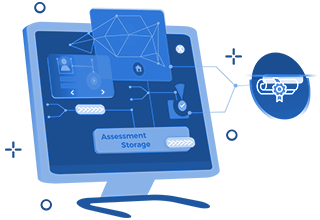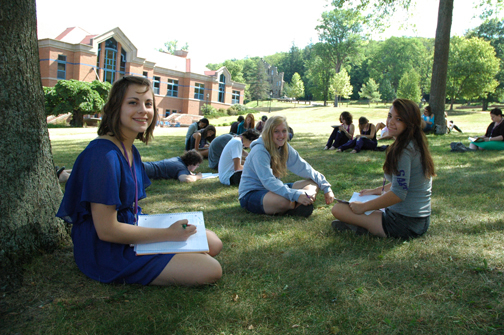 In Alberta, with the exception of the boards of Independent Academic Institutions and the board of The Banff Centre, the governing boards of publicly funded postsecondary institutions are appointed by the Minister responsible for advanced education.
In Alberta, with the exception of the boards of Independent Academic Institutions and the board of The Banff Centre, the governing boards of publicly funded postsecondary institutions are appointed by the Minister responsible for advanced education.
Comprehensive Academic and Research Institutions (CARIs)
Alberta has four universities categorized as Comprehensive Academic and Research Institutions (CARIs) under the Roles and Mandates Policy Framework: the University of Alberta, the University of Calgary, the University of Lethbridge, and Athabasca University. The Universities of Alberta, Calgary, and Lethbridge are campus-based, while Athabasca University is a distance-learning university. Credentials awarded by the universities include bachelor's, master's and doctoral degrees.
The University of Alberta and the University of Calgary offer a broad range of graduate and undergraduate degree programs and account for much of the province's university research capabilities. The University of Lethbridge offers undergraduate degree programs and some graduate degree programs, and also provides the first two years of study in fields such as medicine, dentistry, and engineering for transfer to other institutions. Athabasca University, specializing in part-time and distance education, offers undergraduate degree programs in fields such as business, integrated studies, distance education, science, and nursing, as well as some graduate degree programs.
Baccalaureate and Applied Studies Institutions (BASIs)
Alberta has two Baccalaureate and Applied Studies Institutions (BASIs): Grant MacEwan University in Edmonton and Mount Royal University in Calgary. These institutions are publicly funded and provide a range of programming from academic upgrading to baccalaureate degrees, including applied degrees. Their research activity is largely focused on applied research and scholarly activity to enhance their instructional mandate.
Polytechnical Institutions (PIs)
 Alberta has two Polytechnical Institutions (PIs): the Northern Alberta Institute of Technology in Edmonton (NAIT) and the Southern Alberta Institute of Technology (SAIT) in Calgary. These institutions may offer apprenticeship, certificates, diplomas, applied degrees, and in limited cases, other baccalaureate degrees. They also offer continuing education programs and are increasingly involved in applied research initiatives. PIs respond to market needs and offer programs tailored to workplace requirements.
Alberta has two Polytechnical Institutions (PIs): the Northern Alberta Institute of Technology in Edmonton (NAIT) and the Southern Alberta Institute of Technology (SAIT) in Calgary. These institutions may offer apprenticeship, certificates, diplomas, applied degrees, and in limited cases, other baccalaureate degrees. They also offer continuing education programs and are increasingly involved in applied research initiatives. PIs respond to market needs and offer programs tailored to workplace requirements.
Comprehensive Community Institutions (CCIs)
Alberta has eleven public colleges in the Comprehensive Community Institutions (CCIs) sector of the Roles and Mandates Policy Framework. These colleges provide a range of programming from academic upgrading to applied degrees. They may also offer apprenticeship technical training, the first two years of certain baccalaureate degree programs, and baccalaureate degrees in collaboration with degree-granting institutions. Research activity at CCIs is largely focused on applied research and scholarly activity to enhance their instructional mandate.
The colleges within the CCI sector are also responsible for providing stewardship of adult learning opportunities for defined geographic regions within the province. This includes more closely aligning with the province's community adult learning programs that provide learning opportunities to support literacy and foundational learning, including numeracy, basic computer and foundational life skills, and English language learning.
Independent Academic Institutions (IAIs)
 Alberta has five Independent Academic Institutions (IAIs). Called universities, they are considered private institutions, although they receive public funding for approved degree programs. In addition to baccalaureate degrees, they may also offer master's degrees in specified areas, as well as independent programming through which they may issue their own certification or accreditation through other national or international bodies. Some of Alberta's IAIs have religious denominational affiliations; however, students of all faiths are welcome. They may also offer divinity degrees and other programs that do not need approval of the minister responsible for advanced education.
Alberta has five Independent Academic Institutions (IAIs). Called universities, they are considered private institutions, although they receive public funding for approved degree programs. In addition to baccalaureate degrees, they may also offer master's degrees in specified areas, as well as independent programming through which they may issue their own certification or accreditation through other national or international bodies. Some of Alberta's IAIs have religious denominational affiliations; however, students of all faiths are welcome. They may also offer divinity degrees and other programs that do not need approval of the minister responsible for advanced education.
Specialized Arts and Culture Institutions (SACIs)
Alberta has two Specialized Arts and Culture Institutions (SACIs), each of which serves a unique set of learners. The Alberta College of Art and Design offers bachelor's and master's degree programming focused on visual culture and design. The Banff Centre specializes in non-credit professional development opportunities in fine arts, management studies, language training, and environmental training. Banff Centre students usually have academic credentials and/or professional experience in their area of study prior to admission.
Apprenticeship and Industry Training
The Alberta apprenticeship and industry training system is an industry-driven system. Industry (employers and employees) establishes training and certification standards in more than 50 designated trades and occupations and provides direction to the system through an industry committee network and the Alberta Apprenticeship and Industry Training Board. The government provides the legislative framework and administrative support. In addition to sitting on the committees, individual employers support the apprenticeship and industry training system by employing and training apprentices, thereby providing them with the opportunity to develop their skills on the job.
Eleven public postsecondary institutions (Polytechnical Institutions and Comprehensive Community Institutions) provide most of the technical training portion of the apprenticeship program, based on course outcomes. Post-secondary trade and occupation certificates are granted by the Minister responsible for advanced education, and are held in high regard across Canada. Alberta consistently trains approximately 20 per cent of the nation's apprentices.
Private Vocational Trainers offering licensed programs
There are approximately 150 private trainers that offer licensed vocational training in Alberta. The programs they provide respond to current labour market demand. Licensed vocational training programs prepare students for employment in a wide variety of occupations. Although private vocational trainers do not receive operating funding from the government, student financial assistance may be available to students enrolled in licensed vocational training programs. Private vocational trainers offer their own credentials for licensed programs.
Differences between certificate, diploma, and degree programs at universities, colleges, and technical institutes
 Alberta Apprenticeship programs are available in approximately 49 designated trades in Alberta. Such programs start with an individual choosing a trade and finding an employer. Apprenticeship programs in most of the trades take between three and four years to complete. Apprentices spend about 80 per cent of their time gaining on-the-job training and experience and 20 per cent attending classes at a Polytechnical Institution or Comprehensive Community Institution. Individuals who complete these apprenticeship programs may be eligible to write an Interprovincial Standards (Red Seal) Program examination. If successful on the examination, the Red Seal endorsement, which is widely recognized across Canada, is affixed to their provincial certification.
Alberta Apprenticeship programs are available in approximately 49 designated trades in Alberta. Such programs start with an individual choosing a trade and finding an employer. Apprenticeship programs in most of the trades take between three and four years to complete. Apprentices spend about 80 per cent of their time gaining on-the-job training and experience and 20 per cent attending classes at a Polytechnical Institution or Comprehensive Community Institution. Individuals who complete these apprenticeship programs may be eligible to write an Interprovincial Standards (Red Seal) Program examination. If successful on the examination, the Red Seal endorsement, which is widely recognized across Canada, is affixed to their provincial certification.
Certificate programs prepare students for entry into specific occupations. They normally involve one year or less of full-time study at a Baccalaureate and Applied Studies Institution, Polytechnical Institution, Comprehensive Community Institution, or, in some instances, at a Comprehensive Academic and Research Institution. Certificate programs normally require the completion of some high school studies for admission. In addition to the certificates described, a variety of other certificate programs are offered as pathways into employment or further study, and require higher admission standards (e.g., post-diploma, post-bachelor's and post-master's certificates).
Diploma programs generally prepare students for employment in a particular field or group of occupations. They normally involve two years of full-time study at a Baccalaureate and Applied Studies Institution, Polytechnical Institution, Comprehensive Community Institution, or, in some instances at a Comprehensive Academic and Research Institution. In addition to the diploma as described, a variety of other diplomas are offered as pathways into employment or further study, and requiring higher admission standards (e.g., post-bachelor's and post-master's diplomas).
Applied degree programs provide enhanced career preparation at the bachelor's level that applies to a broader range of career and employment opportunities beyond entry level in an industry. Applied degree programs may be offered only by institutions that have received approval from the Minister responsible for advanced education. Some Baccalaureate and Applied Studies Institutions, Polytechnical Institutions, and Comprehensive Community Institutions offer these programs, which normally consist of about three years of academic studies and about one year of related, supervised work experience in industry. Applied degree programs may have admission requirements similar to those of diploma programs. Completion of a related diploma program may be a prerequisite for admission into year three of an applied degree program. Since 2004, in order to receive approval for new applied degree programs, institutions must meet specific quality requirements consistent with the Ministerial Statement on Quality Assurance of Degree Education in Canada.
 Bachelor's degree programs usually require four years to complete but program length may vary by discipline and institution. Programs longer than four years often incorporate a co-op or work study component. For information on admission, please consult the "Admission Requirements" section below. Bachelor's degree programs may be offered only by institutions that have received approval from the Minister responsible for advanced education (except for degrees in divinity). In order to receive approval, institutions must meet specific quality requirements consistent with the Ministerial Statement on Quality Assurance of Degree Education in Canada. In Alberta, bachelor's degree programs are currently offered at four Comprehensive Academic and Research Institutions, two Baccalaureate and Applied Studies Institutions, two Polytechnical Institutions, five Independent Academic Institutions, and one Specialized Arts and Culture Institution.
Bachelor's degree programs usually require four years to complete but program length may vary by discipline and institution. Programs longer than four years often incorporate a co-op or work study component. For information on admission, please consult the "Admission Requirements" section below. Bachelor's degree programs may be offered only by institutions that have received approval from the Minister responsible for advanced education (except for degrees in divinity). In order to receive approval, institutions must meet specific quality requirements consistent with the Ministerial Statement on Quality Assurance of Degree Education in Canada. In Alberta, bachelor's degree programs are currently offered at four Comprehensive Academic and Research Institutions, two Baccalaureate and Applied Studies Institutions, two Polytechnical Institutions, five Independent Academic Institutions, and one Specialized Arts and Culture Institution.
Master's degree programs normally involve two years of full-time university study beyond the bachelor's degree level. These programs require a bachelor's degree for admission. Applicants who have a three-year bachelor's degree are usually required to complete an additional qualifying year. Master's programs may be thesis- or course-based. These programs may be offered only by institutions that have received approval from the Minister responsible for advanced education (except for degrees in divinity). In order to receive approval, institutions must meet specific quality requirements consistent with the Ministerial Statement on Quality Assurance of Degree Education in Canada. Currently, master's programs are offered by each of the four Comprehensive Academic and Research Institutions as well as at one Independent Academic Institution and a number of non-resident institutions.
Doctoral degree programs normally require two or three years of full-time university study and research beyond the master's degree level. Doctoral programs involve planning and carrying out high-quality research leading to advanced knowledge in the student's field of study. These programs normally include the preparation of a dissertation on an approved topic. Doctoral degree programs may be offered only by institutions that have received approval from the Minister responsible for advanced education (except for degrees in divinity). In order to receive approval, institutions must meet specific quality requirements consistent with the Ministerial Statement on Quality Assurance of Degree Education in Canada. In Alberta, doctoral degrees are offered by each of the four Comprehensive Academic and Research Institutions.
Community Adult Learning Organizations
This network of 130 funded organizations is a key mechanism for the delivery of literacy and foundational learning along the adult learning continuum in Alberta. Organizations facilitate part-time, primarily non-formal adult learning opportunities in local communities to support literacy and foundational learning, including numeracy, basic computer and foundational life skills, and English language learning. They strive to build safe and welcoming local access points to meet the unique needs of the learners that walk through their doors. Organizations also work closely with other learning providers in their communities, including their local Comprehensive Community Institutions, to identify learning needs and work together to address those needs.
First Nations College Grant
The Government of Alberta provides the five First Nations Colleges in Alberta with stable, annual funding under the First Nations College Grant to support initiatives and activities that enhance basic skills, increase access, and improve both retention and learning outcomes for students. The grant supports activities that are relevant in culture and language, respectful of diversity, and support the development of Indigenous knowledge. This grant may complement other sources of funding and ‘in kind' resources that enhance the provision of a range of learning opportunities, including literacy and essential skills, academic preparation for postsecondary studies, certificate and diploma programs, and degree programs in partnership with public institutions.
 English
English Français
Français 日本語
日本語 中文
中文 한국어
한국어 Русский
Русский



 The advanced education system in Alberta is guided by a set of
The advanced education system in Alberta is guided by a set of  The
The  The formal postsecondary system in Alberta began when the first government adopted the creation of a provincial university as a high priority. The University of Alberta began operation in 1908 under government policy that reflected a centralized university model. Over time, the centralized model was challenged and branch campuses in Calgary and Lethbridge were established. Eventually, increasing demand for university education led to the establishment of the University of Calgary in 1966, and then later the establishment of the University of Lethbridge. Athabasca University, modeled on the British "open university," was set up in the 1970s to provide distance education programs, primarily to part-time adult learners. In 2009, two baccalaureate and applied studies institutions were renamed to Grant MacEwan University and Mount Royal University in recognition of their role in providing bachelor's degrees.
The formal postsecondary system in Alberta began when the first government adopted the creation of a provincial university as a high priority. The University of Alberta began operation in 1908 under government policy that reflected a centralized university model. Over time, the centralized model was challenged and branch campuses in Calgary and Lethbridge were established. Eventually, increasing demand for university education led to the establishment of the University of Calgary in 1966, and then later the establishment of the University of Lethbridge. Athabasca University, modeled on the British "open university," was set up in the 1970s to provide distance education programs, primarily to part-time adult learners. In 2009, two baccalaureate and applied studies institutions were renamed to Grant MacEwan University and Mount Royal University in recognition of their role in providing bachelor's degrees. In Alberta, with the exception of the boards of Independent Academic Institutions and the board of The Banff Centre, the governing boards of publicly funded postsecondary institutions are appointed by the Minister responsible for advanced education.
In Alberta, with the exception of the boards of Independent Academic Institutions and the board of The Banff Centre, the governing boards of publicly funded postsecondary institutions are appointed by the Minister responsible for advanced education. Alberta has two
Alberta has two  Alberta has five
Alberta has five  Alberta Apprenticeship programs are available in approximately 49 designated trades in Alberta. Such programs start with an individual choosing a trade and finding an employer. Apprenticeship programs in most of the trades take between three and four years to complete. Apprentices spend about 80 per cent of their time gaining on-the-job training and experience and 20 per cent attending classes at a Polytechnical Institution or Comprehensive Community Institution. Individuals who complete these apprenticeship programs may be eligible to write an Interprovincial Standards (Red Seal) Program examination. If successful on the examination, the Red Seal endorsement, which is widely recognized across Canada, is affixed to their provincial certification.
Alberta Apprenticeship programs are available in approximately 49 designated trades in Alberta. Such programs start with an individual choosing a trade and finding an employer. Apprenticeship programs in most of the trades take between three and four years to complete. Apprentices spend about 80 per cent of their time gaining on-the-job training and experience and 20 per cent attending classes at a Polytechnical Institution or Comprehensive Community Institution. Individuals who complete these apprenticeship programs may be eligible to write an Interprovincial Standards (Red Seal) Program examination. If successful on the examination, the Red Seal endorsement, which is widely recognized across Canada, is affixed to their provincial certification. Bachelor's degree programs usually require four years to complete but program length may vary by discipline and institution. Programs longer than four years often incorporate a co-op or work study component. For information on admission, please consult the "Admission Requirements" section below. Bachelor's degree programs may be offered only by institutions that have received approval from the Minister responsible for advanced education (except for degrees in divinity). In order to receive approval, institutions must meet specific quality requirements consistent with the
Bachelor's degree programs usually require four years to complete but program length may vary by discipline and institution. Programs longer than four years often incorporate a co-op or work study component. For information on admission, please consult the "Admission Requirements" section below. Bachelor's degree programs may be offered only by institutions that have received approval from the Minister responsible for advanced education (except for degrees in divinity). In order to receive approval, institutions must meet specific quality requirements consistent with the  Alberta has three years of senior high school, grades 10 through 12, leading to an Alberta high school diploma.
Alberta has three years of senior high school, grades 10 through 12, leading to an Alberta high school diploma. Alberta Advanced Education aims to provide accessible, affordable, high-quality learning opportunities in Alberta. The Province of Alberta provides a comprehensive student financial assistance program for Albertans to ensure that financial need is not a barrier to learners' success in their postsecondary pursuits.
Alberta Advanced Education aims to provide accessible, affordable, high-quality learning opportunities in Alberta. The Province of Alberta provides a comprehensive student financial assistance program for Albertans to ensure that financial need is not a barrier to learners' success in their postsecondary pursuits.






